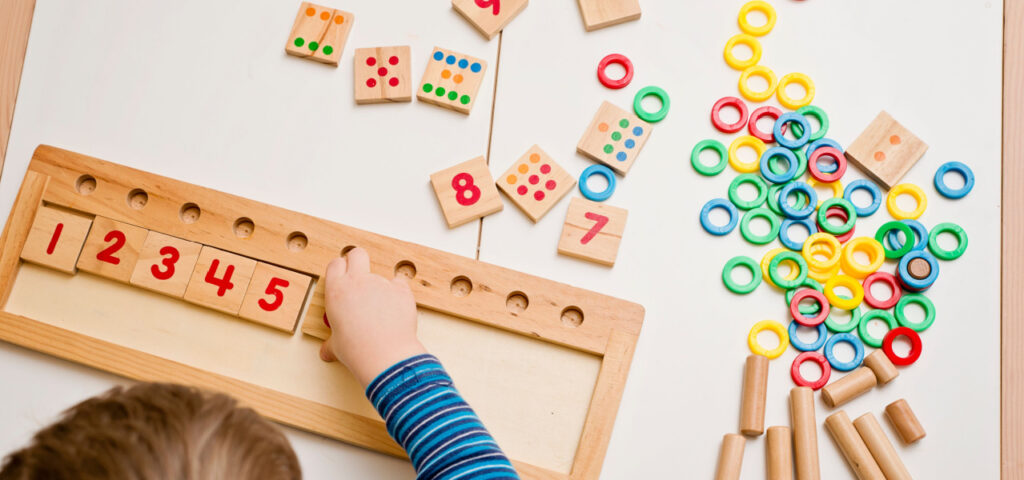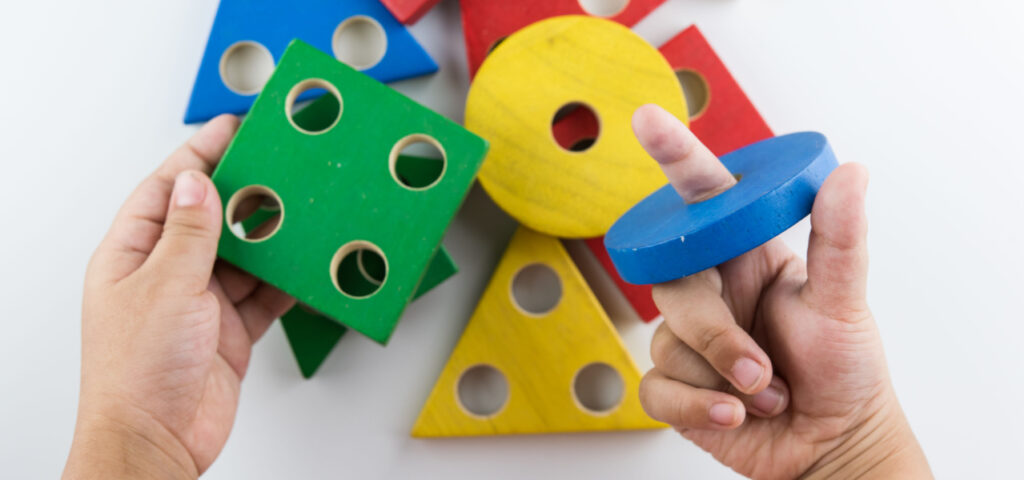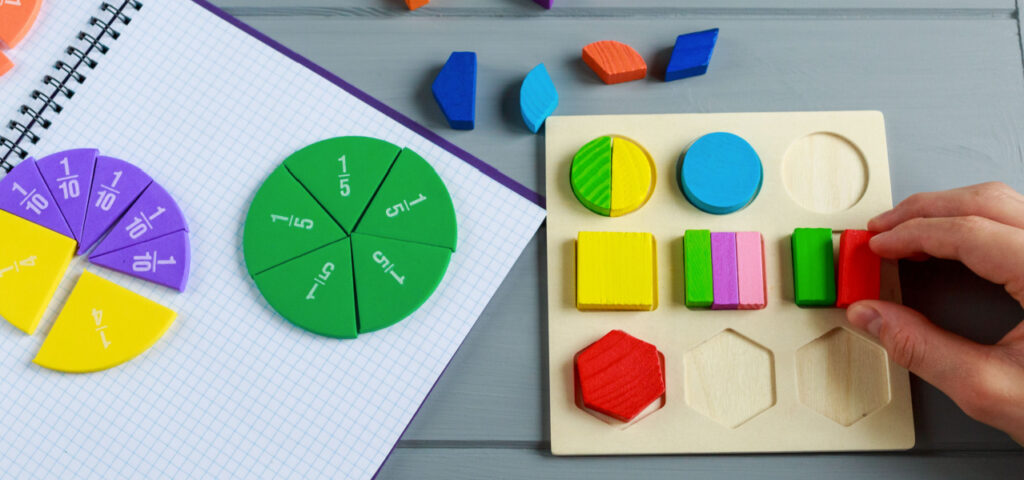
Homeschool Hands-on Math Activities
Adding hands-on math activities to your homeschool math curriculum can add fun and variety to your children’s learning and further enhance their studies. Math can sometimes feel like an abstract and challenging subject, but it becomes more accessible and engaging when paired with tangible, hands-on tasks. It also provides more opportunities for your children to engage with materials and concepts using all of their senses, which can lead to a deeper understanding of mathematical concepts.
The Benefits of Adding Hands-on Math Activities to Your Homeschool
As home educators know, children learn in a variety of ways. Some do well with traditional methods like worksheets and flashcards, but this can limit the ways kids learn and practice. By bringing hands-on activities into your homeschool math curriculum, you provide engaging and entertaining activities that use different parts of the brain. Using a variety of approaches [LINK to Learning styles in Homeschool] helps children find different ways to connect with what they’re learning.

Homeschool hands-on math activities can also be a lot of fun! This is especially important for a subject like math, which can sometimes seem dull to kids. When you add interactive, hands-on elements to your curriculum, children become more engaged, and engaged learners pick up information more quickly and often retain it better.
While you can do a lot of hands-on math activities with everyday items, it’s worth making the investment in a few math manipulatives to use with students. You’ll find endless uses for items like math linking cubes, base ten blocks, and pattern blocks throughout a child’s younger years.
Here are some homeschool hands-on math activities for younger children. These activities can be combined with existing textbooks, worksheets, or online programs to enhance a student’s learning experience.
Preschool and Kindergarten Homeschool Hands-on Math Activities
At this age, students develop number sense and can learn to count up to 100. They recognize that numerals represent a number of objects and understand the concepts of more or less, bigger or smaller, etc … Children can also learn the names of basic shapes and develop the ability to identify and match patterns. Try these hands-on math activities for children ages 3-6 to help build on the early concepts they’re learning:

- Count Everything: Whether it’s the number of peas on a plate, cars in the driveway, or people in the room, use the opportunity to practice counting. Ask children to compare numbers, too, with questions like “Are there more red cars or blue cars?” or “Who has the most crackers left on their plate?”
- Hunt and Count: Indoors or out, hold a scavenger hunt. Ask your children to find three stones and five leaves or to bring you ten items that are green. Work on the concept of counting on and basic addition by asking for more of the same item. For example, you can say, “We have three stones. Can you bring me four more? Now how many stones do we have?”
- Play Go Fish: Use a regular deck of cards with the face cards removed. As you and your child ask each other for specific number cards, your child practices associating the shape of a number with its name. You and your child can then count the number of hearts, clubs, diamonds, or spades on the card.
- Build a Domino Number Line: Sort dominoes by the total number of dots on each, and line up the piles from those that total one to those that total 12. Label each pile with the corresponding numeral written on a piece of paper. This builds a skill called one-to-one correspondence, where kids recognize that a number of items equals a numeral.
- Make Block Patterns: Use a set of shape blocks to create a pattern, and ask your student to re-create it or add on to it. Have them name the shapes and colors used too. If you don’t have pattern blocks, cut shapes from colorful construction paper instead or use any other household items you may have.
1st and 2nd Grade Homeschool Hands-on Math Activities
At this age, children are starting to count with ease, both forward and backward. If you haven’t already, bring in addition, subtraction, and skip counting to prepare them for multiplication. Introduce basic place value, work on telling time and money skills, and build measurement and graphing skills. These hands-on activities can help:

- Play Flashcard I Spy: Lay out addition or subtraction flashcards with math facts your child is working on. Say, “I spy with my little eye a card with a sum of 12.” See how quickly they can find all the cards that match.
- Bowl and Subtract: Pick up an inexpensive toy bowling set or make your own from empty plastic bottles. As kids bowl and knock down pins, have them write the resulting equation. For instance, if there are 10 pins and they knock down 4, write “10-4=6.” It’s also fun to do this with block towers.
- Play Skip Counting Hopscotch: Make the usual hopscotch board on your sidewalk, but label the squares with skip-counting numbers like 2,4,6 or 5,10,15, etc … Skip counting helps prepare students for multiplication, and this is a fun way to practice!
- Match Plastic Eggs: You can use plastic eggs for many hands-on math activities. Label one half with a math fact and the other with the answer or draw an analog clock on one half and write the time out on the other. You can also label an egg with an amount of money, like 67 cents, and ask kids to put the correct amount of coins inside.
- Survey and Graph: Have kids ask questions of friends and family members, then graph out the answers. Start with simple questions like “Do you like chocolate or vanilla ice cream best?” Represent the answer as a bar graph or line graph. The questions can get more complex as they build their graphing skills.
3rd and 4th Grade Homeschool Hands-on Math Activities
Now that kids have mastered basic addition and subtraction, they’re ready to add multiplication and division into the mix. It’s also time for more advanced measurement, including volume and mass, and learning about place value. Children can also practice multi-digit arithmetic with larger numbers. Geometry concepts, like perimeter, area, and more advanced shapes (like the rhombus) make an appearance, too. Use some of these hands-on math ideas to support your homeschooling:

- Multiply with Dominoes: Use dominoes to replace flash cards–somehow, they’re just more fun. Try playing a game: Each player pulls one domino from a bag and multiplies the numbers on their domino. The player with the highest total keeps both dominoes.
- Make Division Pairs: This game is similar to Go Fish, but instead of making number pairs, players must make a pair in which one can divide evenly into the other. For instance, a pair might be 8 and 2 since 8/2=4. Make sure kids say the equation out loud as they lay down each pair.
- Go on a Measurement Hunt: Arm kids with rulers or measuring tapes and ask them to find items that match the clues you give them. For example, you could say, “Find an item that’s 3 ¼ inches long” or “Find something that’s more than 3 feet tall.”
- Use LEGO Bricks for Area and Perimeter: On a large baseplate, have kids make a shape or design using a single layer of bricks. Then, use the studs (raised dots on each brick) to calculate the perimeter and area of their creation.
- Draw Fraction Pictures: Ask students to draw a picture that represents a fraction without using any numbers. For instance, to illustrate 5/7, they could draw five red apples and two green apples, then circle the red apples. Or they might draw a pizza cut into four slices, with one slice missing, to represent 3/4.
5th Grade Homeschool Hands-on Math Activities
Children can work on pretty advanced concepts at this age, like fractions and decimals. Try exploring angles, lines, rays, and other geometric terms, as well as coordinate planes, which helps prepare them for algebra and geometry in the years ahead. The following hands-on activities can keep their learning fresh and fun:

- Convert Improper Fractions with Dominoes: Choose a domino, and turn it so it makes an improper fraction (where the top number is greater than the bottom). Convert it to a proper one. Turn this into a game by having two players flip dominoes at the same time, then convert them into proper fractions. The one with the higher number wins. Convert these fractions to decimals for even more math practice.
- Put Fractions in Order: Make or buy some fraction cards, then deal 10 random cards to each student. Have them race to place the fractions in order from smallest to largest. They’ll need to find common denominators, a skill that can be a little bit tricky. Extra practice can help.
- Play “Can You Make?”: Take some note cards and write a number from 1 to 10 on each, repeating each number several times. Then, make some cards with symbols (+, -, x, =, etc …). Lay out a selection of cards and ask, “Can you make an equation that equals ________?” Challenge them by requesting that they use at least four different numbers or both addition and subtraction. Remind them to follow the order of operations, and when they’re ready, add brackets into the mix.
- Learn Coordinate Planes with Battleship: The game of Battleship is really just a clever use of coordinate planes! Buy the game or make your own DIY version with graph paper.
- Go Shopping for Decimals: Headed to the grocery store? Take along a pencil and paper, and have kids add up the prices of items as you go. This gives them practice with decimals, as well as reinforcing money and budgeting skills.
Homeschool+ and Hands-on Homeschool Math
My Math Academy® is designed to give children preschool through second grade a thorough grounding in the math skills they need to master. Students participate in a variety of online games and activities, learning math concepts and skills through a mastery-based approach. They receive real-time feedback while learning at a pace that’s comfortable for them.
Kids use digital manipulatives in My Math Academy and are presented with many real-life scenarios and applications. When you combine the program’s adaptive approach with the hands-on math activities shared above, you can create the potential for increased engagement and understanding with math.
My Math Academy also includes a unique Progress Tracker that goes beyond task completion and shows you what skills your child has truly mastered, providing you with detailed data on the accomplishments and challenges faced by each child.
Learn more about the Homeschool+ math curriculum and how it can help support your homeschool.